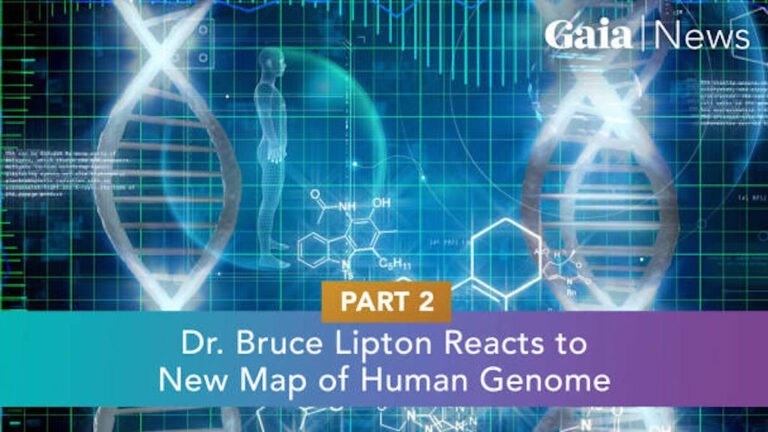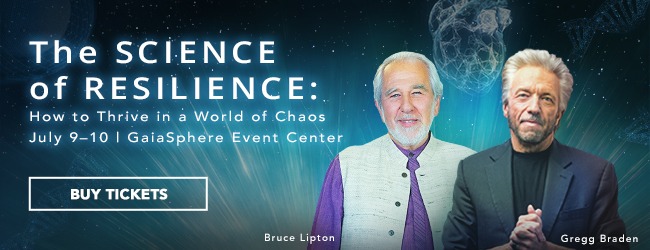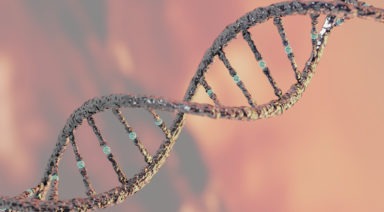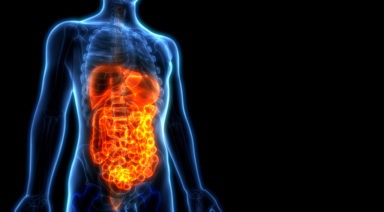Dr. Bruce Lipton Reacts to New Map of Human Genome

As scientists announce the completion of the human genome map, the emerging science of epigenetics provides an alternate view on how we can gain mastery over our genes and achieve true wellbeing.
Dr. Bruce Lipton is a cellular biologist and leader in the field of epigenetics, which holds that external factors can affect our gene expression.
Lipton’s research over many decades has suggested that it is our environment, and even more importantly how we perceive it, that determines our gene behavior.
“Less than one percent of disease is connected to genes,” Lipton said. “Over 90 percent of illness is stress, which means you’re not living in harmony with the environment, and the function of the cells is to adjust their biology to the environment. But I say, ‘But wait, the brain is the interface between the environment and the genes.’ So, my cells don’t know what the real environment is, my cells only respond to my perception of the environment. Well, positive thoughts can heal you of any disease, that’s placebo (effect).”
“Negative thinking can cause any disease, regardless of what genes you have, because negative thinking through epigenetics can rewrite healthy genes and turn them into cancer. You’re creating the good, but you also have to recognize you are participating in creating the negative things as well,” he said.
The biggest roadblock to exerting a positive influence over our genes, Lipton says, comes from faulty programming.
“All of us got programmed the first seven years of our life. We play the program 95 percent of the day,” Lipton said. “The conscious mind, which is the creator mind, is separate from the subconscious mind, which is the programmed mind. The significance is that subconscious is on autopilot, and if 95 percent of your life is coming from the subconscious, then you are playing programs and you’re not playing creator. The issue is the programs we got in the first seven years, up to 60 percent of those programs are beliefs, they’re things that are disempowering, they’re self-sabotaging, or limiting behaviors, and therefore, we’re losing power in the program that says, ‘Who do you think you are? You don’t deserve that. You’re not that smart.’ These are things we acquired when we were young.”
“You have to replace the programs that operate 95 percent of the day, those programs that are not supportive of who you are. Because that means 95 percent of the day you are playing those programs and you don’t see it, but everybody else does. The behavior that’s coming out is not yours, it’s the one you downloaded. But if you rewrote those programs, then the direction of your life radically changes. You can create what you want,” Lipton said.
Lipton suggests several specific ways you can rewrite the programs of your subconscious mind.
“The first way is: how did I get the program in the first place?” Lipton asked. “A child in his first seven years is in a state of ‘theta,’ which is, by definition hypnosis, which is how it downloads the behavior by simply observing mother, father, siblings, community — just watching that. How can you change it?”
“Through hypnosis! Do I have to see a hypnotherapist? Nope,” he said. “The moment you fall asleep, ‘alpha’ disconnects and now you’re in the next lower vibration called ‘theta.’ Every night you go to bed, you put a pair of earphones on, you play a program of what you want to be true in your life — health program, relationship program, job program, whatever it is that is the kind of belief you want to operate from. When it’s coming through the earphones, it’s now going straight into the subconscious mind.”
According to Lipton, other ways of accessing the subconscious and rewriting its programs include repeating positive affirmations and practicing various energy psychology modalities. For Lipton, it’s never been more important to do so.
“There are two things that I recognize that are fundamental to the evolution of this planet. Number one is the one we just talked about, epigenetics because that takes the victim away from me to say, ‘no, I am master of this biology and what it does.’ Number two, you are an eternal spirit energy field that plays through this body. Not only can I not die, but I can create the world that I want. Then all of a sudden then, victimization falls right out the window,” Lipton said.
Study Finds Lack of These Two Gut Bacteria May Lead to Depression

As studies of our microbiota become more focused, scientists have realized that our guts are inextricably linked to the brain and its functions. We now know our gut definitively factors into decision making, though we’ve probably known this informally for hundreds of years, hence the phrase “go with your gut instinct.” And now a new study believes it has pinpointed two specific species of bacteria that, when missing from our microbiome, may lead to depression.
According to the study recently published in the journal Nature Microbiology, out of a group of 2,000 participants, researchers found that those reporting symptoms of depression were lacking two particular strains of bacteria in their gut – Coprococcus and Dialister.





































